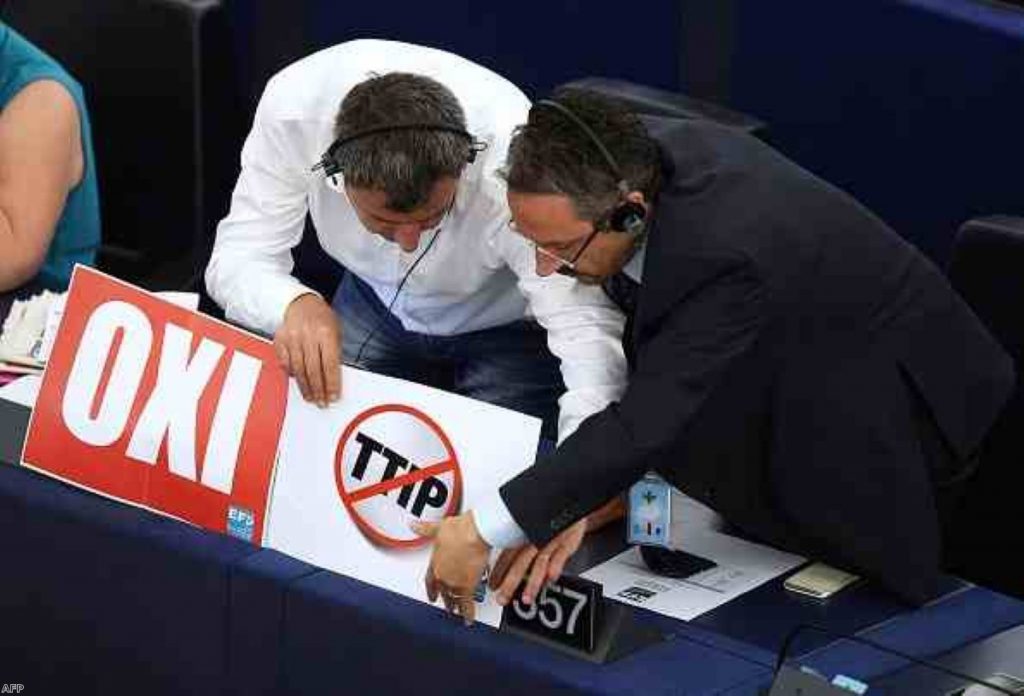TTIP will force all Europeans to take Greece’s medicine
By John Hilary
If the Greek crisis has shown how the institutions of the EU will stop at nothing to force through their own brand of capitalist discipline, TTIP is confirmation that we will all soon be tasting the same medicine.
This week sees the 10th round of negotiations towards the Transatlantic Trade and Investment Partnership (TTIP), the controversial EU-US trade deal that threatens our jobs, our public services and our democracy itself. The talks come hot on the heels of last week's pro-TTIP vote in the European Parliament, where MEPs turned their backs on their electorate in favour of a deal that will benefit only big business and the banks.
The European Parliament passed a resolution on July 8 giving the green light to the continuing TTIP negotiations, despite the fact that a record 2.3 million people from across the EU have now signed a European Citizens' Initiative rejecting the deal altogether. The resolution had to be withdrawn at its initial presentation the previous month, due to crisis within the Parliament's social democratic bloc. It was hastily resubmitted and voted through at the second time of asking, but not without a serious split between Labour MEPs and their sister parties in Germany, Italy and elsewhere.


The greatest fallout came over the new powers that TTIP will grant US corporations to sue European governments for any policies causing future loss of profits, in a parallel judicial system available to them alone. Labour MEPs have come under intense pressure to say no to this investor-state dispute settlement (ISDS) mechanism, and they eventually agreed to vote against the whole TTIP package rather than accept its inclusion. This was a major victory for the UK campaign, which had previously been told that Labour MEPs would not vote against a pro-TTIP resolution. Sadly it was not enough to sway MEPs from other EU member states.
German MEPs from Labour's sister party, the SPD, have played a particularly dirty game throughout the proceedings. Having authored the original pro-TTIP resolution, they then cooked up a back-room deal with conservative and liberal MEPs to force it through with the new ISDS powers included, despite angry dissent from fellow social democrats in France, Belgium and the Netherlands, as well as Labour MEPs.
To add insult to injury, the German president of the Parliament, Martin Schulz, violated procedure in blocking the presentation of any amendments that would have rejected ISDS. Schulz had already been accused of abusing his position for his savage attack on the Greek prime minister Alexis Tsipras earlier in the month, when he publicly called for the removal of the Syriza government and its replacement by a technocratic administration that would impose the full European bailout conditions. If the Greek 'no' vote forced Schulz to eat humble pie, the pro-TTIP resolution was his revenge on the people of Europe.
Together with support from Italian, Spanish and Romanian social democrats, the Germans' TTIP resolution finally passed by a margin of 436 to 241. EU trade commissioner Cecilia Malmström tried to claim the result as a "strong and forward-looking political platform". In reality, with all EU institutions fast losing their legitimacy, it is a shaky foundation on which to build any future deal.
This week’s 10th round of negotiations will see far-reaching talks on almost all aspects of TTIP, including further offers to open up services markets beyond the initial commitments leaked last year. Despite constant assurances from the UK government that public services are safe in TTIP, there is growing evidence that those guarantees are worthless. There will also be more talk over downgrading food safety standards, one of the key demands of US negotiators but a central reason for the European people’s rejection of TTIP. The unelected negotiators of the European Commission clearly inhabit a parallel universe, immune from any concerns as to how public opinion will view them.
We are far from the end of the story on TTIP, as negotiations still have a long way to go before they have any chance of reaching a final deal. Whether they will actually succeed in making it to the finishing line is increasingly doubtful. Any agreement must be ratified by national parliaments across Europe – and with TTIP becoming more toxic with every passing day, that possibility is looking less and less plausible.
Here in the UK, there is the added factor of the in-out EU referendum that we have been promised by David Cameron at some point in the next couple of years. TTIP and the Greek crisis offer a clear indication of the direction in which Europe is heading, where democracy, rights and people’s needs are to be sacrificed on the altar of free market fundamentalism. For those who still harbour the old belief that EU membership is a defence against erosion of our rights at home, current events should be a wake-up call. The writing is on the wall for Europe, and we need to be reading it.
John Hilary is the executive director, War on Want. You can sign the European Citizens’ Initiative against TTIP and CETA at http://waronwant.org/eci.
The opinions in Politics.co.uk's Comment and Analysis section are those of the author and are no reflection of the views of the website or its owners.

